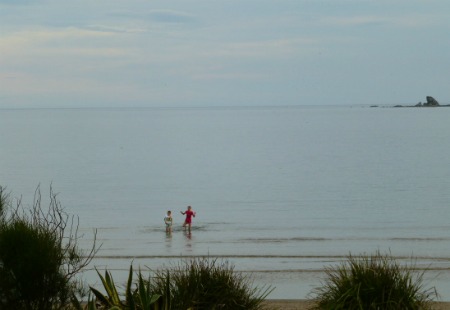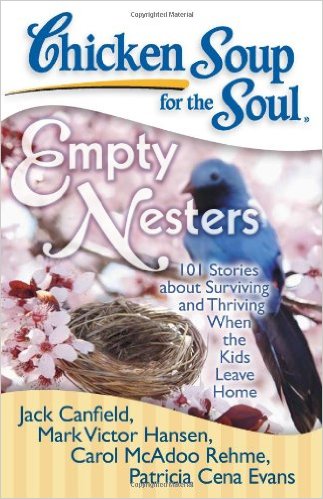Empty Nest Syndrome - How to Cope When the Children Leave Home
The empty nest syndrome is a common form of grief that people often find quite unexpected. It is a type of loss which parents may suffer when their children leave home and they find themselves alone with their partners, or in the case of single parents, completely alone for the first time in years. Those who have neglected their own needs and their own friends often find the prospect of the last child leaving home very daunting. It is especially hard for those whose lives have revolved totally around the kids, for single parents and for those who have stayed in marriages for the sake of the children.
For many having children can mean the loss of identity, which can be difficult to regain. How many times at the school gate have you been introduced as Mary’s mum or Jim’s dad? You become a husband, wife, mum, dad or parent. Where has your own identity gone? When a couple become husband and wife, the woman loses part of her identity by losing her name too.
Parents are pressured by the children to let them join after-school activities, which adds to all the school runs and rushing about. Often very little consideration is given to time management. Children may go to different schools. One parent may work long hours and therefore can’t share in the chauffeuring. If the children are then going to different after-school activities the years fly by in some sort of muddle and chaos.
It is worse for the single parent who may have coped alone since the children were small. Their whole life has revolved around the children. There have been less opportunities to have activities outside the family and they have been the financial provider so work and family have taken up 100% of the time. Separated parents may have had access at weekends which may allow the other to have some sort of freedom. But widows and widowers left with children or separated parents who never see or get help from the other partner may have had a hard time emotionally, socially and financially. They may have experienced difficulty getting babysitters or affording holidays. If they were lucky they may have had extended families nearby but many have coped and soldiered on alone. These brave people should be congratulated.
In these cases the last or only child leaving home can cause anxiety and depression. Going out and suddenly finding a new social group and new friends can seem pretty daunting.
Avoid the risks of empty nest syndrome depression by looking after yourself and your relationships while the children are still at home.
Being a couple and a partnership takes a lot of effort, with give-and-take on both sides. It involves talking, sharing, and supporting each other during the hard times. Budgeting for the family together is also essential. A little bit of empathy and common sense can save a lot of heartache.
Kids and Money
These days parents often give in too quickly to dancing classes or gymnastics (because their friends do it), then other siblings can manipulate - because the sister or brother is doing it ‘why can’t I’? There seems to be a competition between parents too which means that children are being encouraged to do far more extra activities than we ever did in my day.
Couples should make decisions on all this together, as not only time management is involved. The family budget is crucial and is not always considered when the lesson is only $15. But multiplied by 52 weeks and then the same for the other children it can be a lot from the family income. Couples can be committed before the financial implications are apparent and this can put a lot of strain on relationships, and often means that the partners work longer hours.
Empty Nest Syndrome - Grieving for lost time and opportunities
On many occasions couples have said they’d felt their life had been like
a hamster on a wheel, no time to stop. It’s all a round of housework,
shopping, cooking, laundry and work. Plus supporting all the school and
sport activities. What time do the couple have to be individuals or to
be a couple again?
Husbands may have spent long hours working
and time at weekends on the soccer or rugby fields watching games. But
they may have no hobbies of their own. Mothers may have devoted so much
time to school events and being the chauffeur for the children that they
are fearful of what they are going to do with all the free time. They
start to grieve for the lost family and for being needed.

Some
people really do worry and grieve and feel sad and shocked that all
those years have gone by so quickly. They regret that they were so busy
rushing around that they didn’t spend enough time with the family. The
father often regrets that he worked too hard, or took on too many jobs
to cope with the finances meaning he missed a lot of the school and
birthday milestones.
However, we can all only do what we think
is best at the time within a busy family. When you are in the middle of
it all it is difficult to step back and look at the whole dynamic.
Hindsight is always full of 'if onlys'. Don’t feel guilty.
Empty nest parents . . . .
Parents who have neglected their own interests find it harder when the children leave home. Empty nest homes are happier places for those couples who did make time for themselves and still have things in common when the children leave home. They have shared a family life together and talked problems through. They may be relieved to have a few years together again while the children are travelling or at university.
Singles who have kept up with their friends and some of their own interests will find it easier once the children grow up and move on.
Research shows that empty nest syndrome is not quite as common as it was, and take heart - it doesn't usually last as long. This is thought to be because women these days are more independent and career minded, and also because of the advances in technology. Your children might be on the other side of the world, but you can talk to them free by video link these days on Skype any time you like. Read about the research here.
How to cope with empty nest syndrome
This is the time to reassess. For those who do have the empty nest blues, go back to being a couple, enjoy outings and quiet holidays. Remember who you were before the family came along.
Did you want to study? What were your dreams? It is never too late to do a mature student degree or join an amateur dramatic group in the area. Take up a new hobby. Did you ever want to play tennis or golf?
There will be lots of DIY jobs around the house that got neglected during the last hectic few years. Plan jobs together, choose paint colours and carpets. Choose one of the spare rooms for an office or a retreat for yourselves.
After all the years of your hard work raising a family, it is now your turn to do things for yourself. Spoil yourself; change your hairstyle, have a massage, read all the books you never got round to. The list is endless and soon there won’t be enough hours in the day again.
Go back to your dreams, what did you always wish to achieve? Join a night class, meet up with old friends again. Maybe help in a charity shop at weekends. See some of my other lists regarding activities that you may find helpful.
Try a self-hypnosis session with this tailored download created by experts especially for Empty Nesters":
Take stock of your relationship now with your young adult children. It’s very important. They will still need lots of loving and perhaps even financial help. If the children live nearby there will still be lots of visits during vacations. The family unit has changed but it still exists. It will also grow when boyfriends and girlfriends arrive and weddings take place and they will need lots of help when the grandchildren arrive. You have a lot to look forward to.
This initial leaving home may not even be the finality of leaving home. The children are soon back wanting to live at home while looking for a job or while you help plan their wedding. There is even a term now for kids who keep coming back – boomerang kids!
Keep in touch with the children by phone, text, emails, letters. Send birthday and Christmas cards. If the kids are at university for the first time, then phone calls home may be very regular whilst they settle in and make friends. Don’t forget they are homesick too.
Empty Nest Syndrome - if the children are with the other parent
Keep in touch with children who have gone off with the other parent. Still send letters and cards even if they don’t reply. Keep copies of them yourself. They can read them later if they weren’t able to at the time.
Remember that at age 18 children have a right to contact and keep in touch with the other parent. Good relationships can be built then. Keep a lot of their favourite things from childhood in a box so that they can have happy memories going through them years later.
Children often choose to live with one parent and then change their minds as they get older and changeover. It’s all part of them coming to terms with all the changes in their lives.
Some singles join dating agencies or singles groups. Go to the movies with friends or neighbours. There are many ways of making new friends and keeping active.
Don't be afraid to get help if you need it!
If you feel that your natural grief at missing the children is tipping over into depression, it's no shame to get some help. We have joined up with the BetterHelp organisation to offer expert online counseling. This service is completely confidential and flexible to fit around your life. Click here for more information.
Finally, check out this excellent 5 star reviewed book written especially for Empty Nesters:
Chicken Soup for the Soul - Empty Nesters
Related Pages:
Empty Nest Divorce - The Causes and How to Avoid It
For more help and advice see any of the pages in How to Deal with Grief
- Grief and Sympathy Home
- Relationship Grief
- Empty Nest Syndrome
- Grief and Sympathy Home
- Disenfranchised Grief
- Empty Nest Syndrome
Where to get help:
Have You Considered One-on-One Online Grief Counseling?
Get Expert and Effective Help in the Comfort of Your Own Home
The following information about online counseling is sponsored by 'Betterhelp' but all the opinions are our own. To be upfront, we do receive a commission when you sign up with 'Betterhelp', but we have total faith in their expertise and would never recommend something we didn't completely approve.
Do you feel alone and sad with no support and no idea how to move forward? It can be tough when you are stuck in grief to find the motivation to get the most out of your precious life.
Online counseling can help by giving you that support so you don't feel so alone. You can have someone to talk to anytime you like, a kind and understanding person who will help you to find meaning in life again, to treasure the memories of your loved one without being overwhelmed and to enjoy your activities, family and friends again.
- Simply fill out the online questionnaire and you will be assigned the expert grief counselor most suitable for you. It only takes a few minutes and you don't even have to use your name.
- Pay an affordable FLAT FEE FOR UNLIMITED SESSIONS.
- Contact your counselor whenever you like by chat, messaging, video or phone.
- You can change counselor at any time if you wish.
- Click here to find out more and get started immediately.
- Or read more about how online counseling works here.
Sales from our pages result in a small commission to us which helps us to continue our work supporting the grieving.
Hypnosis for Grief - 10 Ways It Can Help You
Try a gentle hypnotherapy track to relax the mind. Learn how self-hypnosis can help you cope with grief at any time of the day or night.

For Remembrance:
Sales from our pages result in a small commission to us which helps us to continue our work supporting the grieving.
Memorial Jewelry to Honour a Loved One
Check out our lovely range of memorial jewelry for any lost loved one. Pendants, necklaces, rings or bracelets, we have them all in all kinds of styles. Choose for yourself or buy as a sympathy gift.
Create an Online Memorial Website
Honour your loved one with their own memorial website. Share photos, videos, memories and more with your family and friends in a permanent online website. Free for basic plan with no ads.











